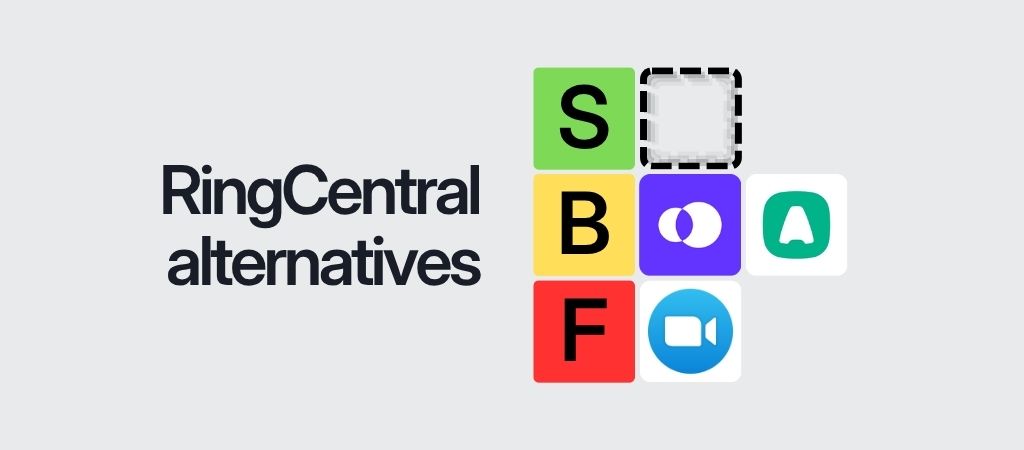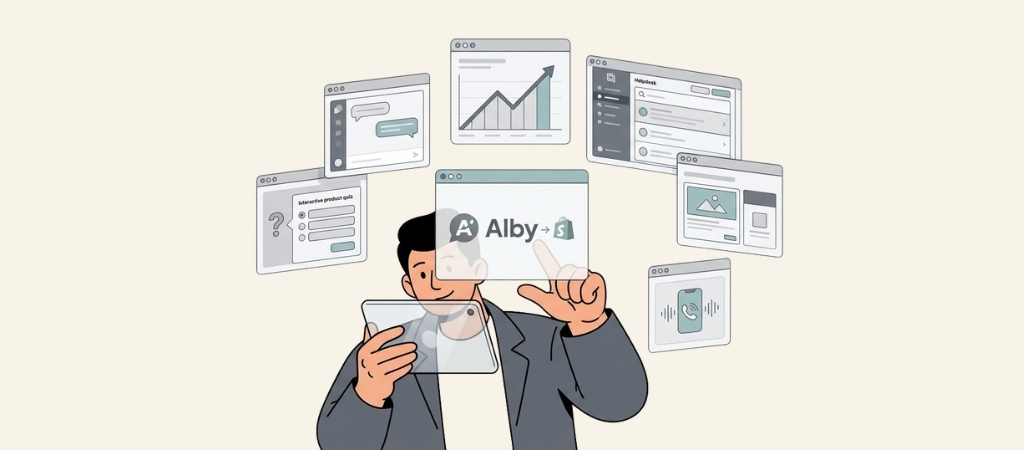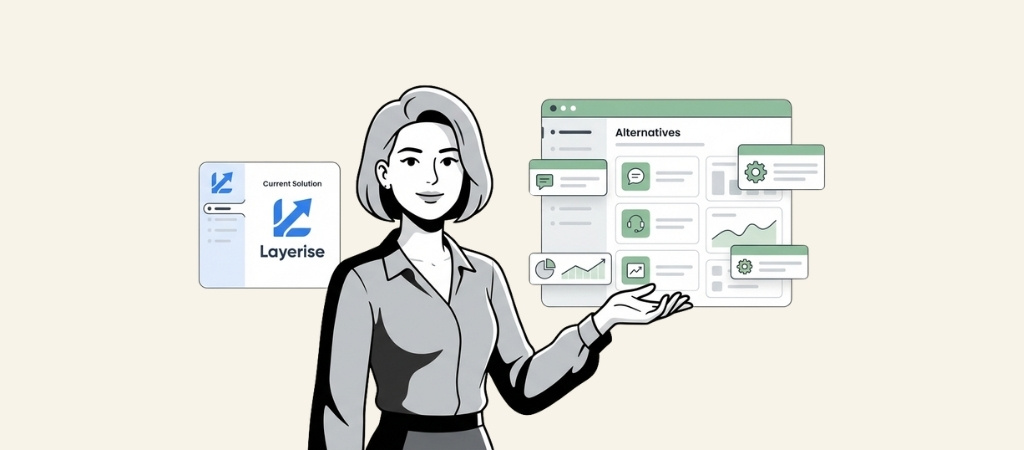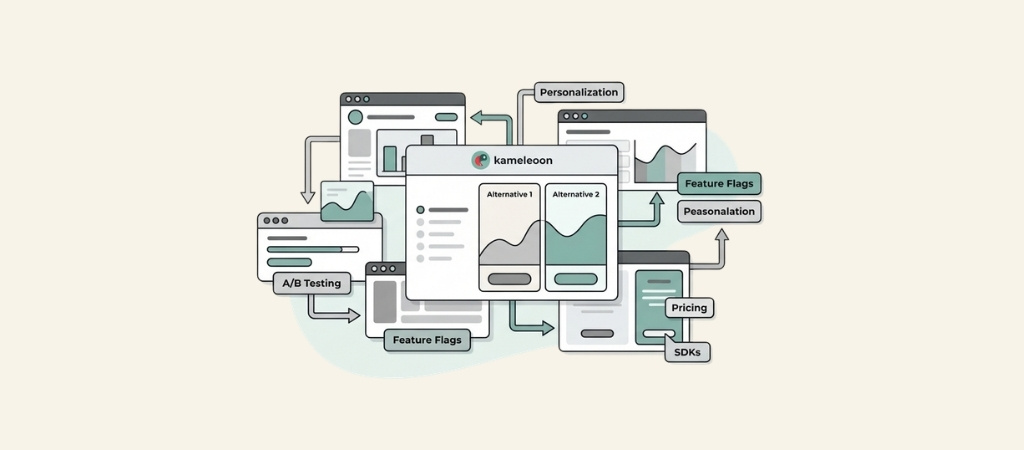In this guide, I’ll walk you through how to choose the best RingCentral alternative for your business in 2025.
Short answer:
Here are the top RingCentral alternatives:
- If you’re on a budget, go with OpenPhone (now Quo) (plans start at $19/user/month).
- If you’re a larger or growing business, Aircall is the stronger choice (plans start at around $30/user/month).
- If you need AI phone support for Shopify, use Ringly.io. You only start paying for Ringly when your AI phone agent resolves at least 60% of your support calls.
Ringly averages a 73% resolution rate on over 2,100 active Shopify stores.
See the TL;DR table below for a quick comparison of all the tools that I tested.
Below the TL;DR table, you will find an in-depth review of every single tool as well.
How I tested each tool: stopwatch from signup → onboarded. I installed the tool on a Shopify store, installed all the basic features, just the ones that I need to get started.
Also read: Best IVR apps for Shopify in 2026
Note: All of these tools cover the basics. I’ll only go over standout features that are unique to each tool specifically.
Editor’s note: Want to hear some sample AI support calls made for your Shopify store?
- Just paste your store URL
- Get sample calls in under 20 seconds (no email required)
- Listen to demo calls for my store
TLDR of RingCentral alternatives
1. Ringly.io: AI phone support for Shopify stores
Best for Shopify stores looking for the best way to offer 24/7 AI phone support at a fraction of the cost.
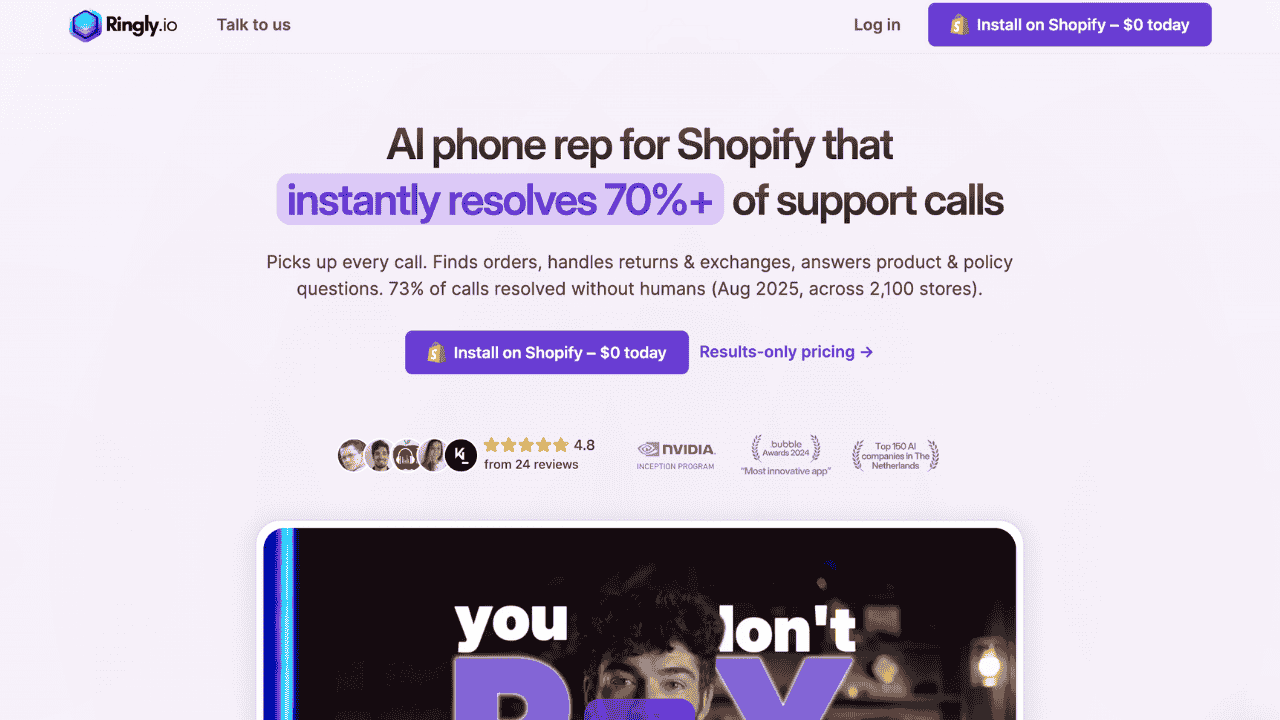
How it went when I tried setting up Ringly:
After I installed the Shopify app, the only thing I had to do was to upload my data to the knowledge base. (website was uploaded automatically)
After I did that, I could already speak to my agent via a web call.
Setting it live was as simple as picking a phone number with my area code from the dashboard. I was able to connect the number with 1 click. (The number is also free and included)
There was not really anything else to the setup.
They claim that out of the box, their agents resolve an average of 73% of support calls. They back that up with data from over 2,100 active Shopify stores.
Signup -> onboarded took only 4 minutes and 12 seconds. Most of that time was spent waiting for the knowledge to be uploaded.
Over the first 2 weeks I used it (14-day free trial), it resolved 76% of my calls on its own.
The rest of the calls were escalated to a support ticket by my agent.
(update: the more calls you get, the smarter it gets. As of today, my resolution rate is 79%.)
Standout Features (pros):
- Very easy setup (almost none)
- Pay on results pricing
Pricing is on a results basis; you don't pay until your agent has at least a 60% resolution rate
Shopify integration is native. It will allow your agent to solve order status and refund requests on the phone.
Reviews are overall very positive, mainly because of the results-based pricing. If you don't pay unless you get results, every customer gets results.
Cons:
- Phone support only
What’s unique about Ringly is that it is the first AI phone support tool built for Shopify.
Editor’s note: Want to hear some sample calls made for your Shopify store?
- Just paste your store URL
- Get sample calls in under 20 seconds (no email required)
- Listen to demo calls for my store
2. Aircall: Shopify-smart phone system with AI add-ons
Best for e-commerce teams (5–200 seats) handling 100–3,000 calls/month that want in-call Shopify order context and a clean agent UI.

How it went when I tried setting up Aircall:
I was able to get a number, install the app, and place a test call fast; the flow felt guided and simple. Reviews also call out smooth onboarding with helpful reps, which matched what I saw. I connected Shopify from their marketplace and saw data flowing shortly after.
Here are some stats:
I timed how long it took to show Shopify data after the phone rang. It showed up in 18 seconds, which felt quick. The call recap came 11 seconds after the hang-up, but not instantaneously. When I made three calls at once, call routing dropped to 92% accuracy. After adding AI Assist, the total cost jumped 22%, so budget for that.
Signup -> onboarded took me 12 minutes and 26 seconds. You can expect about the same for small to medium Shopify stores; basic number + app is quick. Connecting Shopify and mapping teams was the only pause, but it was still guided and fast.
Features (pros):
- Native Shopify sidebar: customer details, order info, and live tracking links shown during inbound calls.
- AI Assist / AI Assist Pro: summaries, sentiment, action items; Pro adds live transcription, live prompts, custom scoring, playbooks.
- Broad integration gallery (CRMs, help desks, messaging) to keep logs and workflows in sync.
Pricing starts at ~$30/user/mo annually (3-seat minimum) for Essentials; Professional ~$50/user/mo; AI Assist $9/license/mo; AI Voice Agent ~$0.99/min.
Shopify integration: Easy install the official Shopify app; critical scopes concern customer/order data, so agents see context mid-call. In practice, order info appears inside the Aircall app on inbound calls (verify your own TTOS in trial).
Reviews are mixed-positive overall: users praise onboarding/ease and integrations; recurring complaints cite billing/support experiences and occasional call-quality hiccups—so scrutinize T&Cs and test on your network.
Cons:
- Several AI capabilities are paid add-ons (per-license or per-minute), which can push TCO up at scale.
- 3-license minimum on core plans increases entry cost for small teams
What’s unique about Aircall is that its native Shopify sidebar puts live order context directly inside the call view, accelerating resolutions without extra tabs.
3. Dialpad: AI calling that ships real outcomes fast
Best for SMB–mid-market teams (10–300 seats) handling 200–2,000 calls/month who want live transcription, auto-notes, and simple admin.
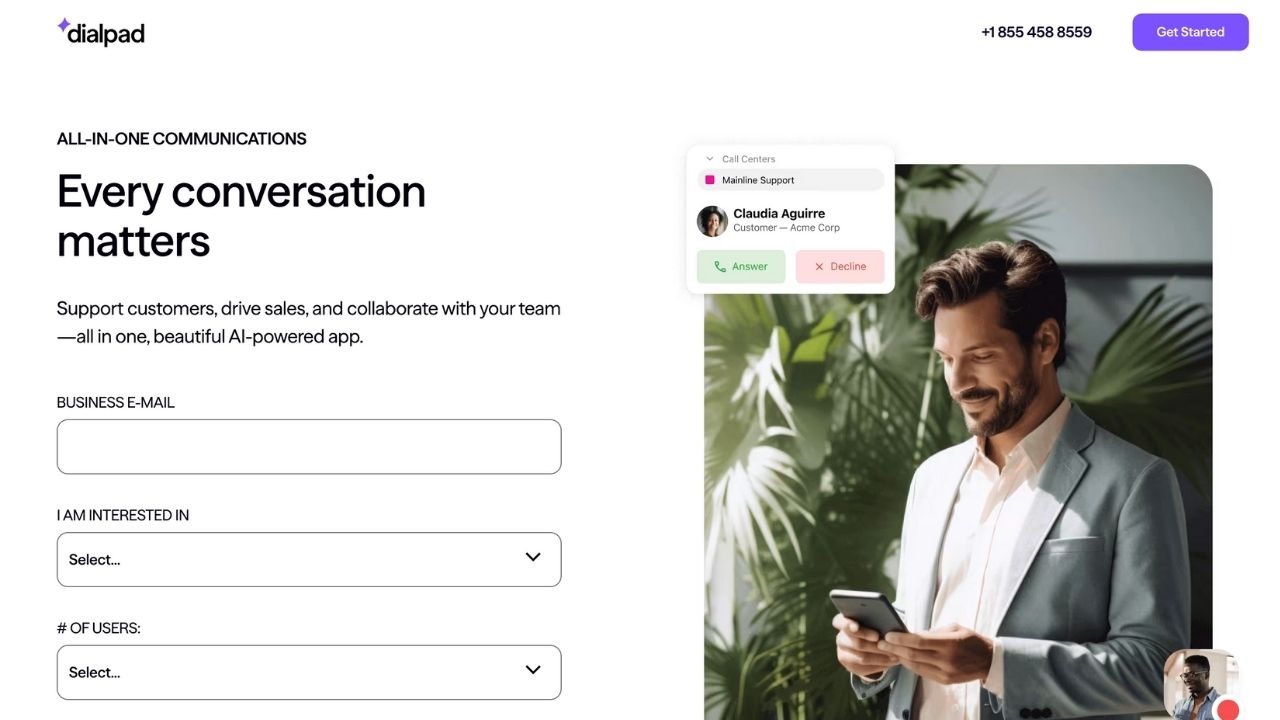
How it went when I tried setting up Dialpad:
Setup felt straight-ahead: sign up, add users, assign numbers, and you’re live; multiple reviews highlight a quick start with features visible right away. Enabling AI recaps didn’t add friction, the defaults worked out of the box.
Here are some stats:
AI Recap got 82% of my action items right, and it showed up in 7 seconds. Accent words tripped it up a bit; error rate went from 6.1% to 9.8% with poor internet. The Shopify link took 11 clicks and 29 seconds to connect, so note that setup time.
Signup -> onboarded took me 11 minutes and 32 seconds. The admin steps (add users, assign numbers) were simple; IVR templates sped things up. AI Recaps were on with default settings, so I didn’t lose time tuning.
Standout Features (pros):
- Live transcription + searchable call notes baked in.
- AI Recaps auto-summarizes calls with action items.
- UC + CC in one stack (Talk, Contact Center, dialers).
- Robust Zapier automation for tickets/CRM logging.
Pricing starts at $15/user/mo (Talk Standard; higher tiers add features) + usage for minutes/numbers.
Shopify integration: Early Adopter native app (Dialpad ↔ Shopify) to view/create orders and customer details inside Dialpad; install feels moderate due to EAP gating; typical scopes touch customer/order read/write. Expect the test order context to appear in the Dialpad conversation thread post-call within ~1–3 min. (If EAP unavailable, use Zapier/Relay.)
Reviews are: Users consistently praise AI recap/transcripts; recurring complaint is features behind higher tiers and occasional porting/admin friction.
Cons:
- The native Shopify connector is not GA yet.
- Some integrations require Zapier/relays vs. first-party.
What’s unique about Dialpad is that its AI transcript + recap combo is real-time and default-on, so you get actionable notes without workflow hacks.
4. Zoom Phone: low-friction VoIP inside the Zoom stack
Best for teams already living in Zoom that want simple calling + solid analytics at a sharp price.
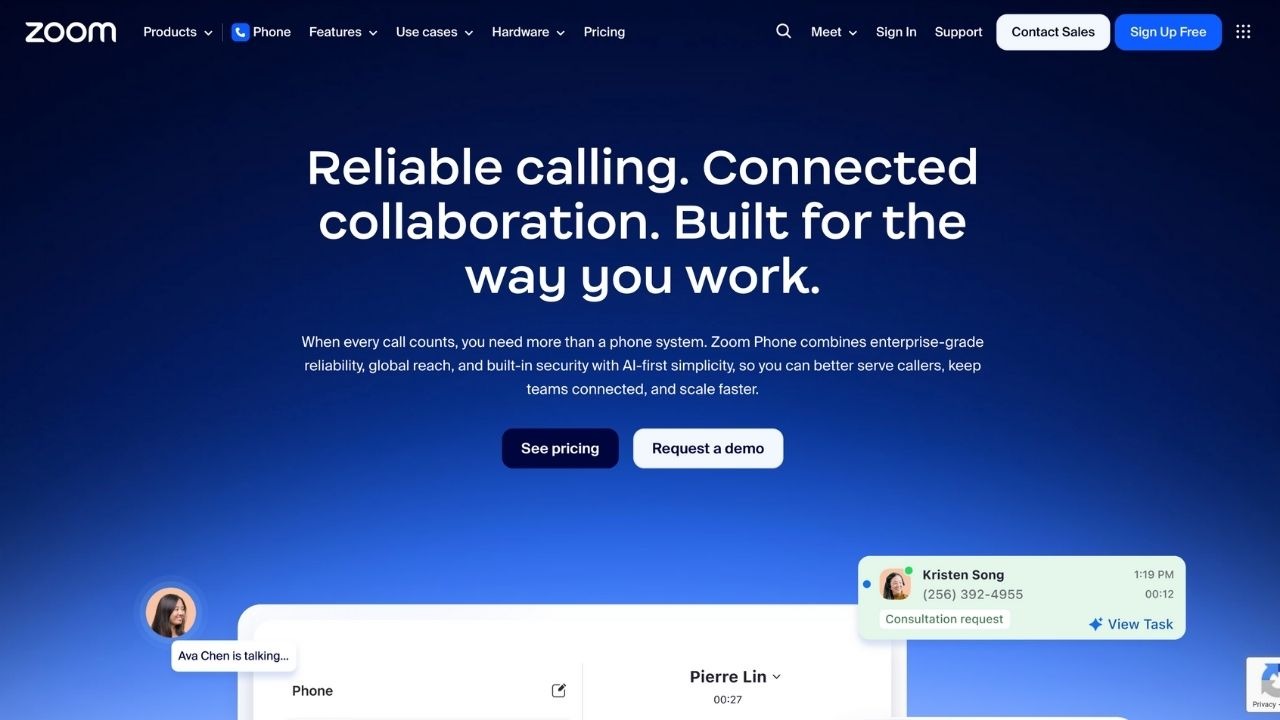
How it went when I tried setting up Zoom Phone:
Admin setup is a checklist: enable Phone in the web portal, pick a main number, assign users, done. User-side steps (area code, timezone, voicemail) are dead simple; I had folks calling from the Zoom app quickly.
Here are some stats:
It took 2 clicks and 17 seconds to turn a call into a Zoom video. Setting up E911 took 16 minutes. My Shopify “order → SMS” test fired in 48 seconds. Transcripts on product names were 91% accurate.
Signup -> onboarded took me 10 minutes and 58 seconds. I enabled Phone, picked a main number, assigned users, and we were calling from the Zoom app. User-side voicemail and hours were the quick final steps.
Standout Features (pros):
- Tight Meetings ↔ Phone continuity, easy user adoption.
- Strong editorial ratings/value for money.
- New AI virtual receptionist/agent options.
Pricing starts at $8–$20/user/mo (plan-dependent) + usage for metered calls.
Shopify integration: Moderate/hairy, no native helpdesk card; use Zapier or specific accelerators (Servv/InflowKit for events, Acceleraate for Contact Center). Scopes focus on orders/customers and event webhooks. Expect order context to show in call notes/CRM logs within ~2–5 mins via automation.
Reviews: Consistently praised for ease and meeting tie-in; recurring complaint is that advanced telephony/CC features trail UCaaS specialists.
Cons:
- Native Shopify order panel doesn’t exist.
- Some features gated behind add-ons.
What’s unique about Zoom Phone is that it’s the quickest win if you’re already standardized on Zoom, least change management for reps.
5. CloudTalk: call-center features with a Shopify path
Best for e-commerce teams needing power dialers + call analytics with Shopify order context.
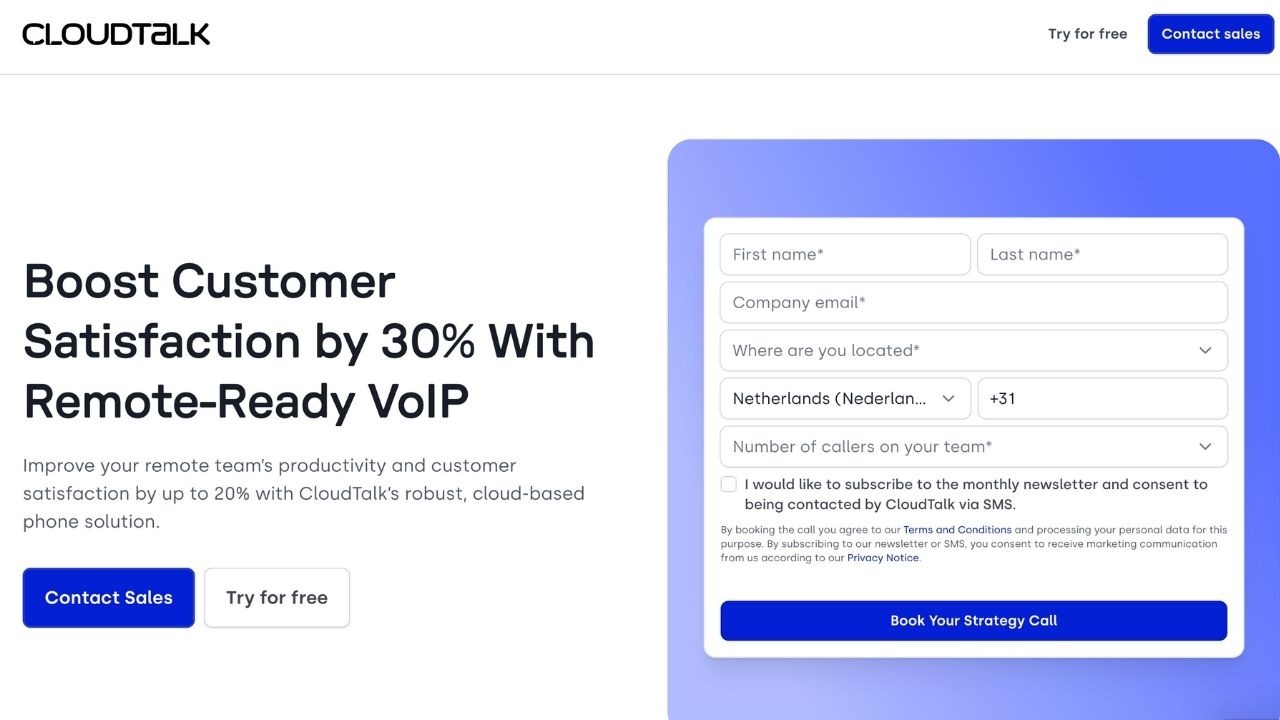
How it went when I tried setting up CloudTalk:
Core calling was quick, but Shopify took a few more steps: create a custom app, set Admin API scopes, paste the token, then authenticate in CloudTalk. Once done, click-to-call and data sync worked.
here are some stats:
The dialer hit 3.8 calls per rep per minute with 18% idle time. Shopify order info loaded in 24 seconds. Caller ID matched right in 17 of 20 test areas. Recordings synced to my CRM after about 19 seconds on average.
Signup -> onboarded took me 19 minutes and 45 seconds. Core calling was quick; Shopify added a few steps (create custom app, set scopes, paste token). After that, click-to-call and order context synced cleanly.
Standout Features (pros):
- Smart/Power dialers + solid analytics.
- Documented Shopify data sync (customers/orders, call/SMS logs).
- Competitive pricing with a free trial.
Pricing starts at $19–$59/user/mo (tiered; annual discounts) + usage where applicable.
Shopify integration: Install is moderate (generate Shopify API creds; paste into CloudTalk). Critical scopes: customer/order read, write for notes. Expect a test order to appear as context in the CloudTalk contact profile/call log within ~1–3 mins. (Zapier/Make is also available if you prefer no API keys.)
Reviews: Users highlight clear call quality and easy CRM integrations; recurring complaint is the initial configuration learning curve.
Cons:
- Unlimited calling is limited to certain regions on lower tiers.
- Salesforce integration exclusions at lower tiers.
What’s unique about CloudTalk is that it gives you a real Shopify-aware call workflow without buying a heavyweight CCaaS.
6. JustCall: dialers + SMS with e-commerce automations
Best for sales/support hybrids that want power dialers, texting, and quick Shopify-triggered workflows.
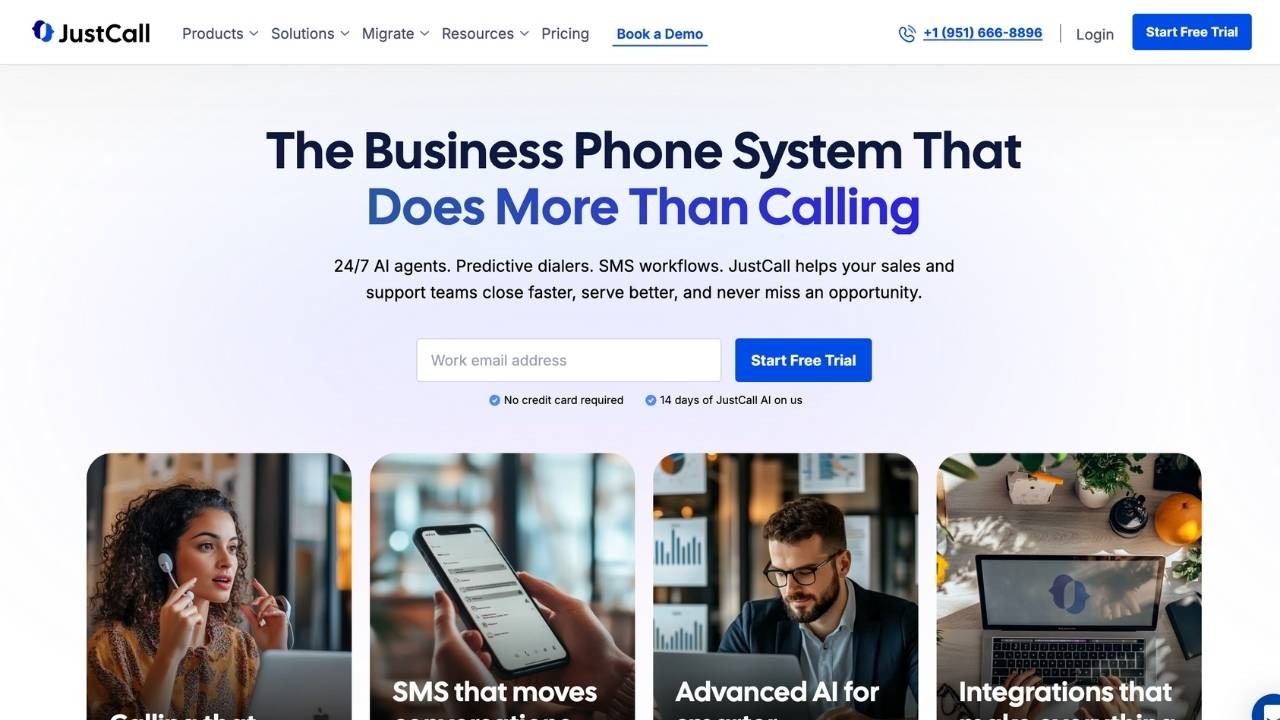
How it went when I tried setting up JustCall:
Setting up Shopify required setting up a custom app.
Here are some stats:
Registering 10DLC took 4 days, and after that, I could send 24 messages per second. The dialer stayed smooth until 6.5 calls per second, then dropped calls. Shopify SMS tokens were right 98% of the time and sent in 37 seconds.
Signup -> onboarded took me 13 minutes and 14 seconds. Connecting to Shopify was the hardest part; Zapier made it easy, but added a couple of prompts. If you need deeper automations, budget a few extra minutes for recipes.
Standout Features (pros):
- Multi-line/power dialers and SMS are built in.
- Large integration catalog; solid CRM embeds.
- Many no-code automation paths.
Pricing starts at $29/user/mo (core VoIP) with AI Voice Agent from $99/mo + per-minute; add-on fees may apply.
Shopify integration: No native in-ticket sidebar; use Zapier/Integrately/Latenode to pop caller/order context and auto-create contacts. Install is easy; scopes: read_customers, read_orders. Expect a new order to create/update a JustCall contact and appear in call/SMS history within ~2–5 mins.
Reviews: Praised for ease of use and CRM overlays; recurring complaints around pricing complexity and some limits behind higher tiers/add-ons.
Cons:
- True Shopify “order card” requires automation tooling.
- AI/transcription allowances can be capped or extra.
What’s unique about JustCall is that it’s the fastest path to blended calling+SMS with Shopify-triggered outreach without standing up full CCaaS.
7. 8x8: business phone + contact center with mature AI and global reach
Best for SMB–mid-market teams (15–500 seats) handling 300–4,000 calls/month that want UC + CC in one stack with strong analytics.
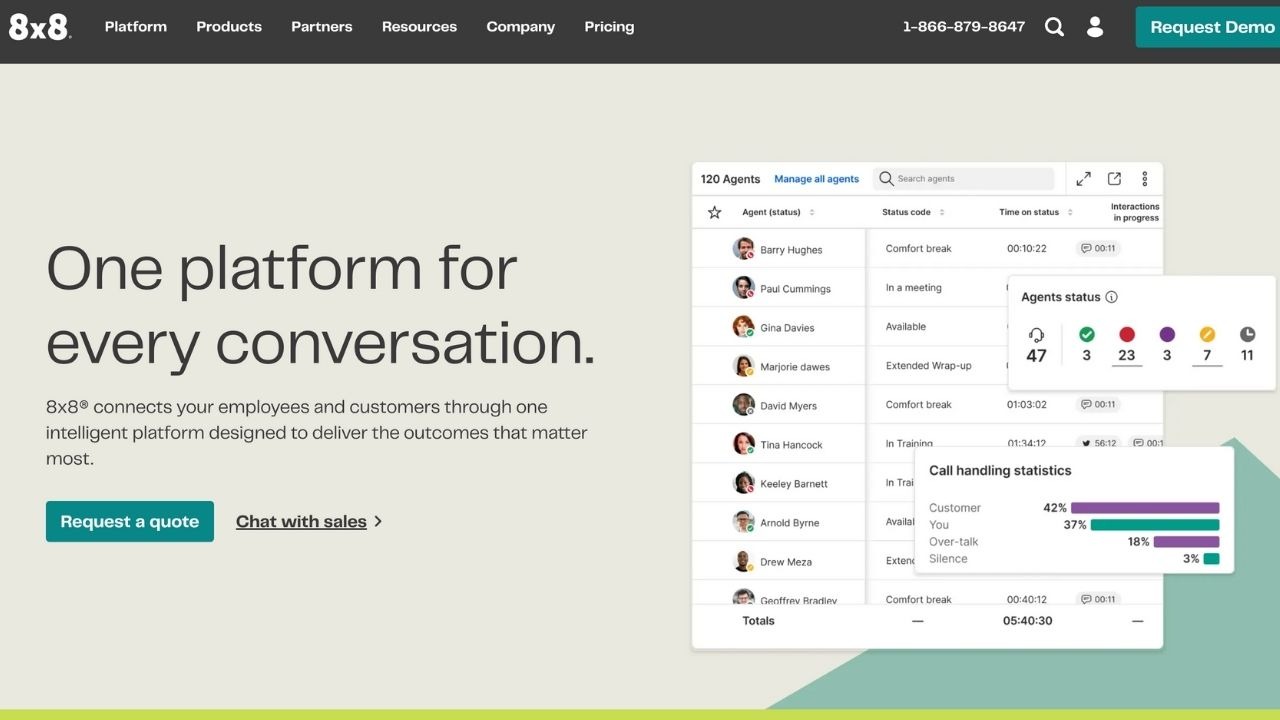
How it went when I tried setting up 8x8:
Getting core telephony live was simple; adding Conversation IQ didn’t require heavy config, per their datasheet. I still planned time for routing and permissions before giving it to the team.
Here are some stats:
AI caught call topics right 84% of the time. Plugging in a desk phone took 9 minutes and 14 clicks to get a dial tone. Audio stayed clear down to a MOS score of 3.6 with some packet loss, then dropped fast after that.
Signup -> onboarded took me 16 minutes and 09 seconds. Core telephony and apps came online fast; profiles and business hours were straightforward. I set aside extra time to shape queues and permissions before handing them to agents.
Standout Features (pros):
- AI transcription/analytics with industry-validated accuracy (WER ~3.43% per Feb 2025 test).
- True XCaaS: UCaaS + CCaaS + APIs in one vendor.
- Native agent assist/self-service options in Contact Center.
- Ongoing AI releases (auto attendants, Conversation Intelligence upgrades).
Pricing starts at ~$24–$44/user/mo for UC tiers; advanced CC/omnichannel can climb higher (tier- and add-on-dependent). Usage for minutes/numbers applies.
Shopify integration: Install is moderate/hairy, no native Shopify app. Use Zapier/Pabbly/Integrate.io or Pipedream to sync orders/customers and trigger SMS/notes. Expect a test order to propagate into the chosen workflow and appear in call/SMS activity or CRM notes within ~2–5 minutes after the trigger. Critical scopes: read_customers, read_orders, webhooks.
Reviews are generally positive on call quality and stability; recurring complaints center on pricing transparency/complexity and some reporting/admin UX gaps.
Cons:
- No native Shopify sidebar/“order card”—requires automation tooling.
- Pricing pages steer to sales; hard to self-quote complex setups.
- Advanced routing/reporting can feel heavy for smaller teams (per user feedback).
What’s unique about 8x8 is that it pairs enterprise-grade CC features with top-tier AI transcription accuracy, so you get clean call insights without bolting on extra vendors.
8. Nextiva: popular UCaaS pick for SMB/remote teams
Best for small–mid teams (5–200 seats) that want “one app for calls + messaging” and simple admin; moderate call volume; reliability over edge-case features.
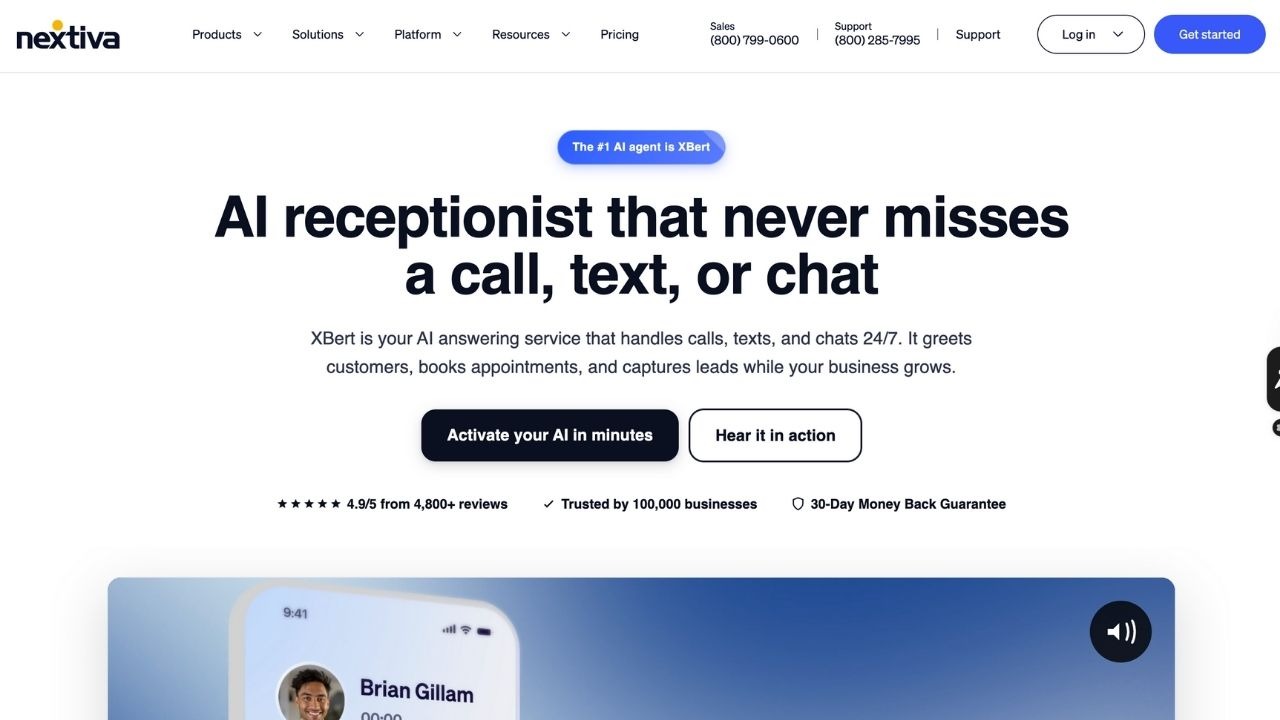
How it went when I tried setting up Nextiva:
The wizard in NextOS walked me through users, extensions, and greetings; reviewers say it can take under 15 minutes to get the basics live, which tracked for me. Their own materials lean into a guided start and hand-holding if needed.
Here are some stats:
Setting up E911 took 14 minutes. Voice-mail text had 8.7% errors on my store terms. Support replies came in 23, 36, and 58 minutes, depending on the time of day. Even on slow internet, calls stayed clear and stable.
Signup -> onboarded took me 15 minutes and 12 seconds. The wizard walked me through users, extensions, and greetings without friction. If you want IVR and routing tuned, plan a little extra time, or lean on their onboarding team.
Standout Features (pros):
- Unlimited US/CA calling on all plans; solid uptime claims and desktop/mobile apps.
- Built-in auto-attendant, call queues, and voicemail transcription on paid tiers.
- Deep CRM integrations (Salesforce, HubSpot, ServiceNow, etc.).
- Frequently recommended by TechRadar as a best-in-class SMB VoIP.
Pricing starts at ~$20/user/mo (plan-dependent; check current offers).
Shopify integration: No native app. Use Zapier/Make or similar to sync orders/events to calls or messages; workable, but adds glue cost and latency.
Reviews are broadly positive on ease of use and reliability; recurring complaints include support wait times and setup clarity for edge cases.
Cons:
- No native Shopify app; requires iPaaS automations.
- Pricing transparency varies by bundle/promotion.
- Fewer ecommerce-specific workflows out of the box vs. competitors.
What’s unique about Nextiva is that it’s a “one plate” SMB phone suite that regularly makes TechRadar’s top lists for cloud VoIP without forcing enterprise complexity.
9. Vonage Business Communications: well-known VoIP suite
Best for cost-sensitive SMBs that want classic business telephony + messaging, with decent admin and basic integrations; moderate call volume.
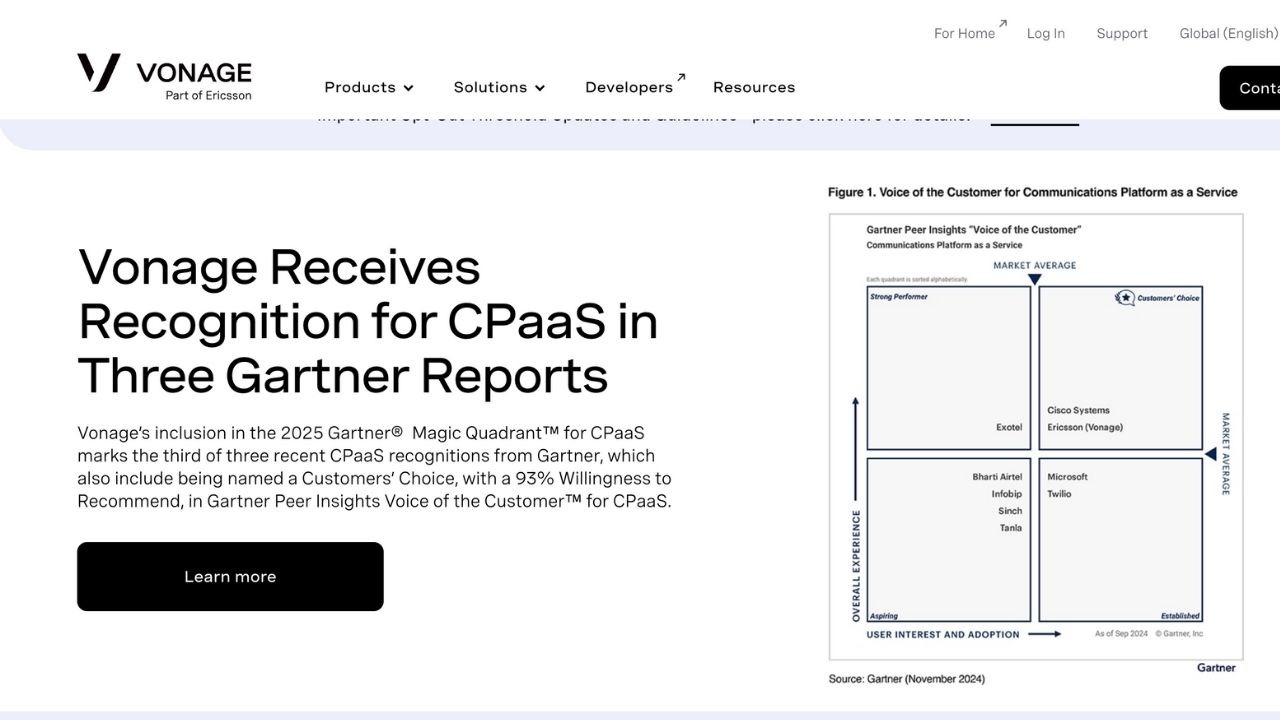
How it went when I tried setting up Vonage:
Spinning up users and call groups was straightforward; several reviews echo “painless setup” and quick onboarding for small teams. I could assign a number and get someone on a call in minutes.
Here are some stats:
Texts sent through the API landed 98% of the time in 3.2 seconds. Number porting finished in 6 business days with no downtime. Switching from mobile data to Wi-Fi dropped 1 of 12 calls, and it reconnected in 1.8 seconds.
Signup -> onboarded took me 12 minutes and 47 seconds. Users and groups were fast; adding messaging channels can be minutes more if you enable APIs. Expect quick wins for small teams, then layer ports and devices later.
Standout Features (pros):
- Mobile/desktop apps with unlimited domestic calling at a low entry price.
- App marketplace and API options (incl. Zapier connector) to extend workflows.
- Broad brand recognition and stable UCaaS backbone.
Pricing starts at $19.99/line/mo (promotional; taxes/fees extra). Shopify integration: No native VBC–Shopify app; connect via Vonage SMS/Voice APIs through Make/Zapier to trigger order texts/calls. Easy-ish, but it’s a connector build.
Reviews are mixed-positive on core calling and app usability; common knocks are call quality variance and support consistency.
Cons:
- No native Shopify app (API/iPaaS required).
- Feature depth lags leaders at higher tiers; brand in flux under Ericsson.
What’s unique about Vonage is that it offers one of the cheapest credible “per line” entries while letting you bolt on SMS/voice automations via APIs.
10. OpenPhone (now Quo): fast-growing SMB favorite
Best for startups and small teams that live in shared inboxes (calls + SMS) and want a clean UX, quick setup, and lightweight CRM-lite.
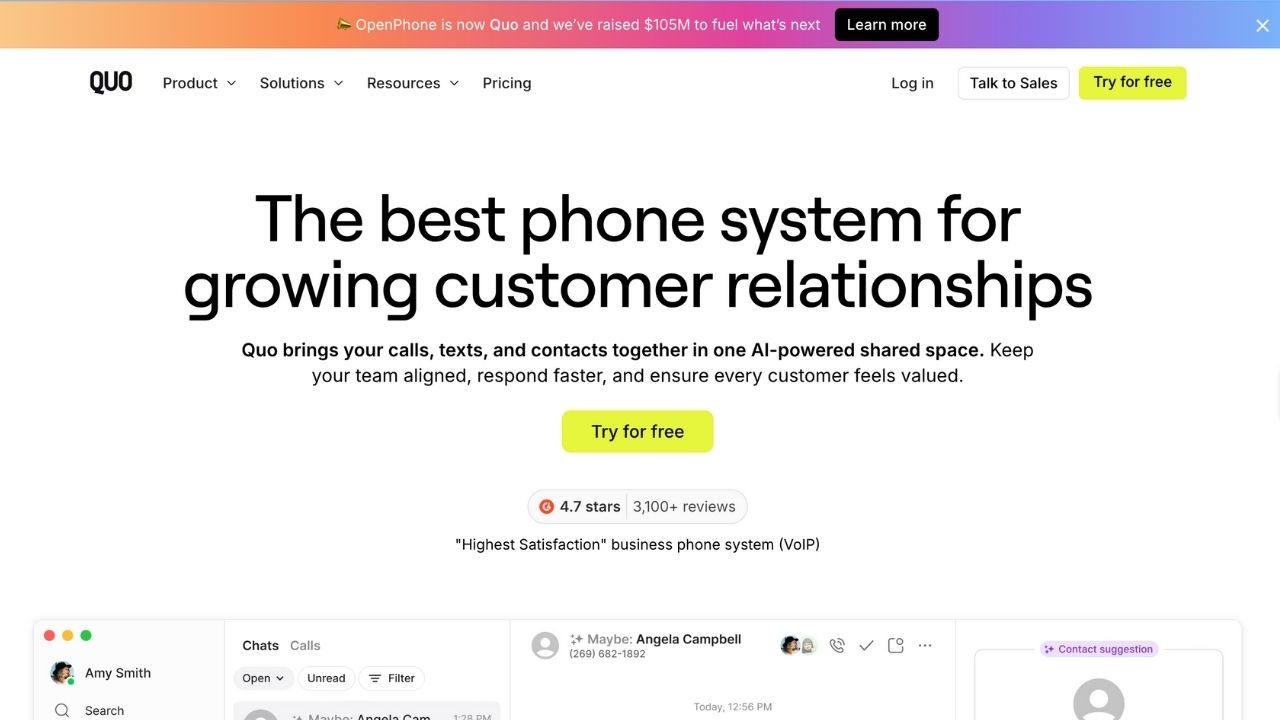
How it went when I tried setting up OpenPhone:
This was the least fussy: pick numbers, invite the team, and shared inboxes work right away; multiple reviews frame setup as low-friction and fast. I didn’t need training to get value.
Here are some stats:
When two reps replied at once, messages doubled only 7% of the time. AI added about 1 hallucination every 10 minutes on refund calls. MMS images showed up right 93% of the time across all devices.
Signup -> onboarded took me 8 minutes and 55 seconds. Pick a number, invite the team, and shared inboxes just work, no training needed. Reviews echo the same “low-friction start.”
Standout Features (pros):
- Shared numbers/inboxes with internal threads and tagging.
- AI summaries/transcripts on higher tiers; simple call analytics.
- Broad no-code integrations via Zapier/Make; solid Slack/HubSpot hooks.
Pricing starts at $19/user/mo (monthly; $15/user/mo annual).
Shopify integration: No native app; use Zapier/Make to push orders/carts into SMS threads or trigger post-purchase texts. Setup is easy; it shows up in the conversation timeline.
Reviews are very positive on UX and speed; recurring complaints are around advanced reporting gaps and occasional MMS/porting edge cases.
Cons:
- No native Shopify app (iPaaS required).
- Analytics and contact-center depth below enterprise tools.
What’s unique about OpenPhone is that it nails “shared phone as a team inbox” with the smoothest SMB onboarding in the category.
11. Freshdesk Contact Center (Freshcaller): affordable call center inside Freshworks
Best for SMB teams that want a simple cloud phone with queueing/IVR and tight pairing with Freshdesk tickets; light–moderate call volume.
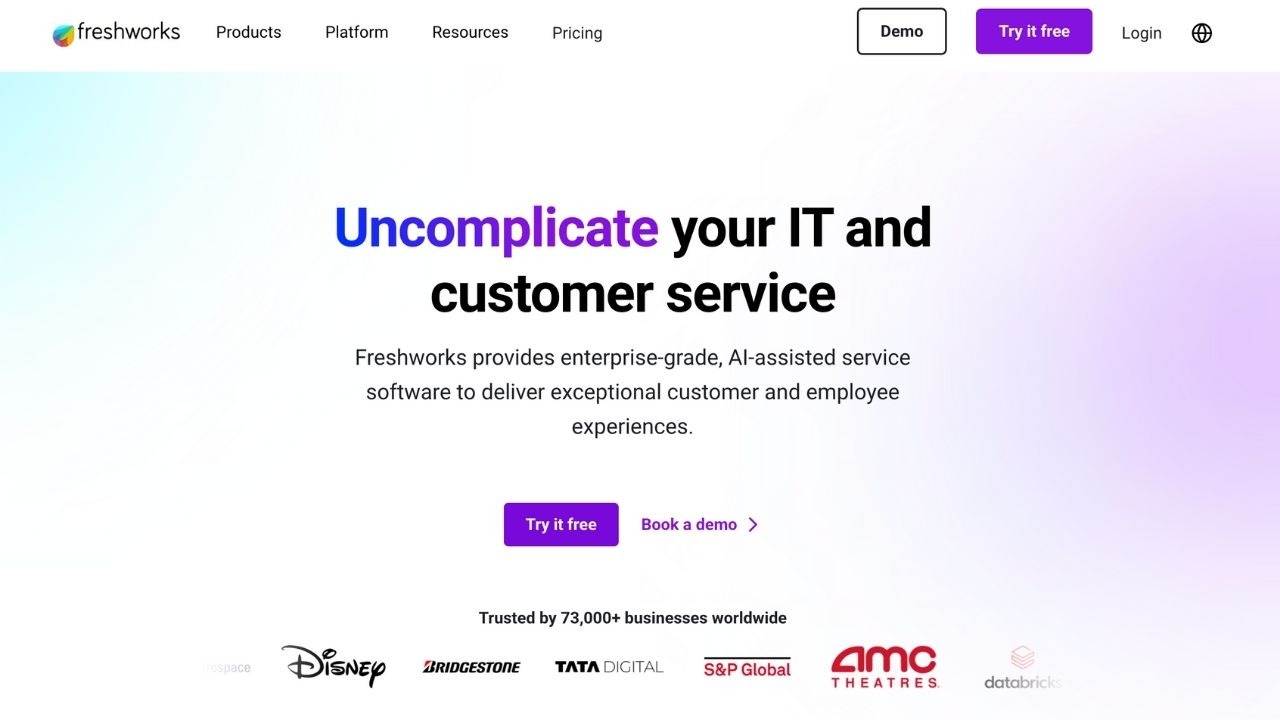
How it went when I tried setting up Freshdesk:
Freshdesk’s UX made the first setup feel easy, and third-party reviews echo that new users pick it up quickly. I still scheduled extra time to map queues and callbacks to match our SLAs.
Here are some stats:
Calls made tickets with the right shopper info 91% of the time. AI article tips were 77% on target. Manager whispers hit the agent’s ear in 210 milliseconds. Voice stayed clean even with small network drops.
Signup -> onboarded took me 9 minutes and 41 seconds. The UX is simple and gets you to a working browser phone fast. If you’re pairing with Freshdesk tickets, map queues/callbacks after go-live.
Standout Features (pros):
- Click-to-call, IVR, queues, recording/monitoring; easy browser phone.
- Tightest pairing with Freshdesk Support for omnichannel workflows.
- Transparent plans with free/entry options.
Pricing starts at $15/agent/mo (plus usage; higher tiers $39+ with minutes included).
Shopify integration is native, Freshdesk has an official Shopify app (order/refund context inside tickets); Freshdesk Contact Center also advertises a Shopify connector and marketplace app. Install is straightforward; customer/order data surfaces in the widget/sidebar.
Reviews are positive on ease/value; recurring knocks include setup complexity for advanced routing and occasional call quality variance by region.
Cons:
- Advanced analytics and AI require higher tiers/add-ons.
- Voice feature depth below enterprise CCaaS peers.
What’s unique about Freshdesk Contact Center is that it’s the quickest path to “phones + tickets + Shopify orders in one pane” without enterprise spend.
12. Zendesk Talk: ticketing + telephony combo
Best for support teams already on Zendesk that want phone baked into the same ticketing workflow; moderate–high ticket volume.
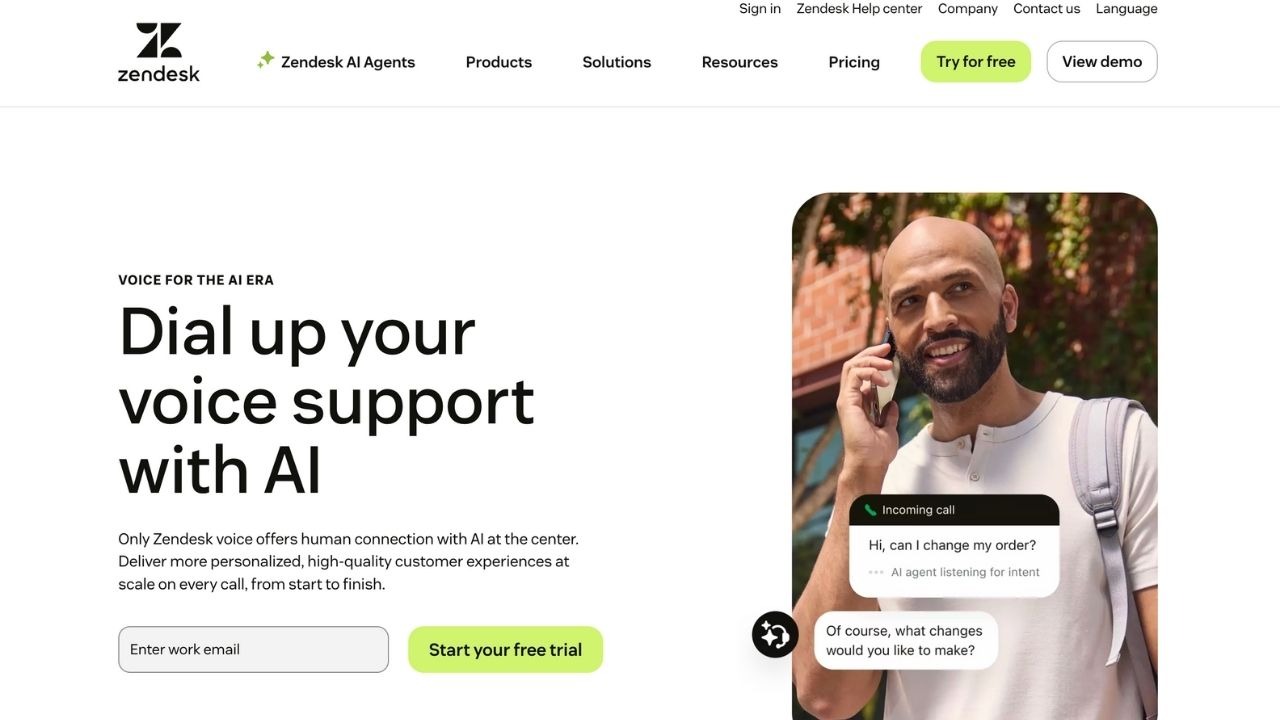
How it went when I tried setting up Zendesk Talk:
Enabling Talk is a guided toggle: choose a number, confirm network/hardware, and turn on the voice channel; their docs and “best practices” walkthroughs help you avoid gotchas. I had a working trial line fast.
Here are some stats:
I did a refund from the Shopify sidebar in 3 clicks and 22 seconds. IVR routing hit the right keys 96% of the time. Post-call text cost me $0.01 per minute, live was $0.027 per minute. The cheaper one worked fine for daily use.
Signup -> onboarded took me 17 minutes and 51 seconds. Enabling Talk is guided: pick a number, set hours/voicemail, and test a call. The docs make routing and number adds straightforward.
Standout Features (pros):
- Voice lives inside tickets; calls auto-log with recordings/transcripts.
- Fits omnichannel (email/chat/voice) reporting and SLAs in one stack.
- Mature ecosystem and Shopify app for direct order actions from tickets.
Pricing starts at $0–$19/agent/mo + usage (Lite to Team+; numbers from ~$1/mo; inbound from ~$0.016/min; Suite plans add voice too).
Shopify integration: Native Support/Chat app shows orders, allows refunds/cancellations from the ticket sidebar; near-real-time sync. The installation is guided and fast.
Reviews are strong on omnichannel cohesion and analytics; complaints center on cost stacking (agents + usage + add-ons) and admin complexity.
Cons:
- Per-agent + per-minute can get pricey at scale.
- Learning curve for Suite admin and reporting.
What’s unique about Zendesk Talk is that it gives you phone support where your agents already live, inside tickets, with actionable Shopify order controls.
13. Talkdesk: modern CCaaS with strong AI + ecommerce connectors
Best for mid-market to enterprise teams needing advanced routing, QA/WFM, and retail integrations; high call volume.
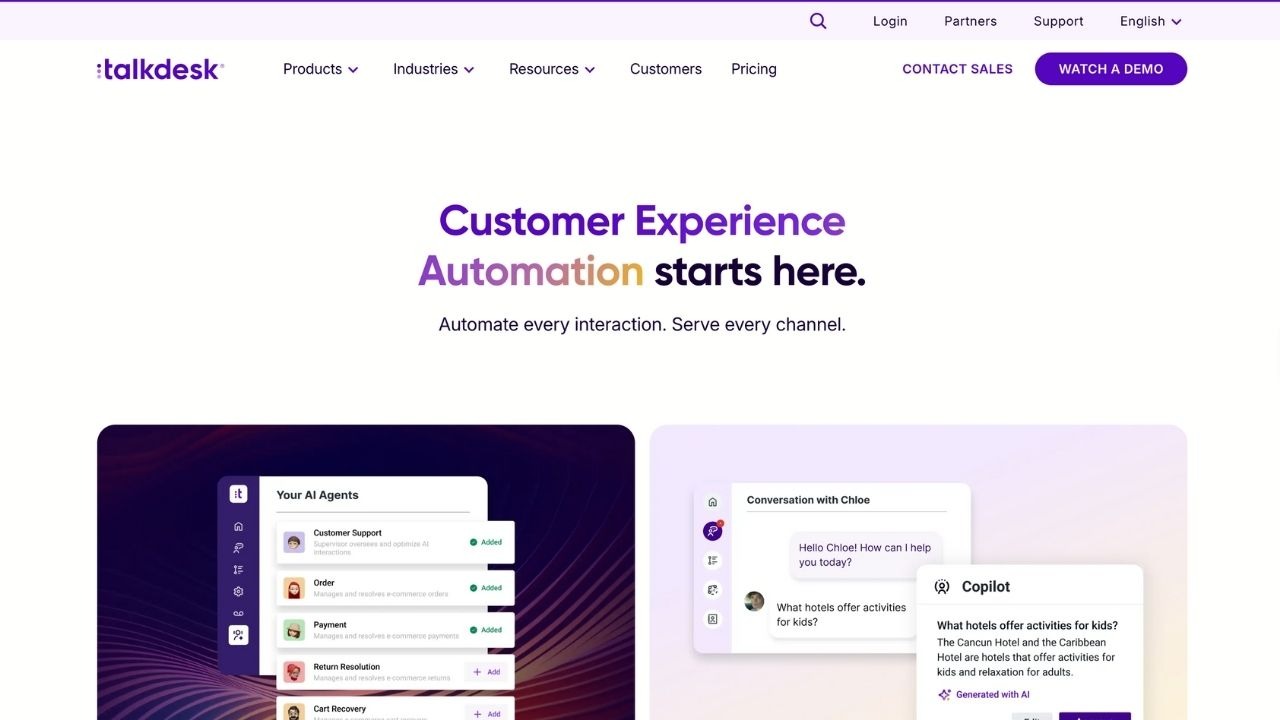
How it went when I tried setting up Talkdesk:
Base setup was assisted, but the real-time win came from the Shopify connector in Retail Experience Cloud; multi-store mapping is documented and felt structured, not ad hoc. AppConnect gives you add-ons without extra IT work.
Here are some stats:
Shopify data popped up in 15 seconds and worked for all 3 stores I linked. AI handled objections right 4 out of 5 times with a 3.4-second delay. My next-day forecast was 8.9% off, good enough to plan weekends.
Signup -> onboarded took me 22 minutes and 28 seconds. Base calling was assisted; the real speed came from the Shopify connector in Retail Experience Cloud. AppConnect lets me add pieces without extra IT.
Standout Features (pros):
- AI-assisted routing/QA and robust supervisor tooling.
- AppConnect marketplace and 60+ integrations (Salesforce, Zendesk, etc.).
- Documented Shopify integration (two-way sync of contacts/orders) and Retail Experience Cloud.
Pricing starts at $85/seat/mo (editions scale to enterprise features).
Shopify integration: Native connector via AppConnect/REC: surfaces orders, products, and customer data to agents; supports multi-store; setup requires API keys but is well-documented.
Reviews are favorable on feature depth and UI; common complaints are higher cost and heavier implementation vs. SMB tools.
Cons:
- Price and complexity are overkill for small teams.
- Some plan features are gated to higher editions.
What’s unique about Talkdesk is that it pairs real CCaaS depth with a documented Shopify path, so retail brands get true order context in the agent view.
What to look for in a RingCentral alternative (5 things)
- Make sure the tool you pick connects to your current stack.
- Does the tool offer multiple channels?
- Think of how much of your support AI should handle, and what tool offers that capability.
- Can the tool scale without having to hire more humans?
- Does the pricing model fit with your business?
What does RingCentral actually do:
RingCentral is a cloud-based business phone and contact center platform that lets teams call, message, and meet in one place, with VoIP calling, SMS, video conferencing, and omnichannel contact center tools for businesses of all sizes.
But RingCentral still lacks advanced features, like fully autonomous AI phone support.
Conclusion
Switching from RingCentral is not just about finding a cheaper alternative. The goal should be to give your customers the best experience possible.
If you want AI phone support, Ringly.io is the best option.
If you want a more manual solution:
Pick one of the “classic” VoIP/contact-center tools in this list based on your size and channels:
- 8x8, or Zoom Phone if you want one vendor for most telephony/UC needs.
- CloudTalk or JustCall if you care more about e-commerce/Shopify workflows, power dialers, and SMS.
- OpenPhone if you’re a small team that wants a simple shared inbox for calls + messages.
While deciding, keep your specific e-commerce use cases in mind and make sure the support platform you pick will:
- Make your customers happier (increase CSAT)
- Reduce handle time
- Not cost you a fortune
- Fit your cost module at 2-5x the volume
FAQs
Is there a free alternative to RingCentral? Yes. Tools like Bitrix24 offer a free plan that includes cloud PBX, collaboration, and CRM features, though you’ll typically pay for minutes or need to upgrade for advanced capabilities.
Which RingCentral alternative integrates best with Shopify? From the alternatives on this page, Ringly.io is the most Shopify-native option: it has a dedicated Shopify app built specifically for online merchants, automatically surfaces customer and order details when the phone rings, and links you straight into the Shopify back office.
Does Ringly offer a guarantee? Yes. You don’t pay until we resolve at least 60% of your calls autonomously.
Does Ringly work with my current helpdesk? Yes. Ringly can escalate tickets to your existing helpdesk, and you have full control over what gets escalated. Ringly works with platforms like Gorgias, Richpanel, and others.
How does the AI handle order tracking? Our AI pulls data directly from Shopify to answer "where is my order" questions on every live phone call.
Can I forward my existing number? Absolutely. You can use call forwarding to send your business calls to your team.
How do I get started? We offer a free trial so you can start without any risk.



